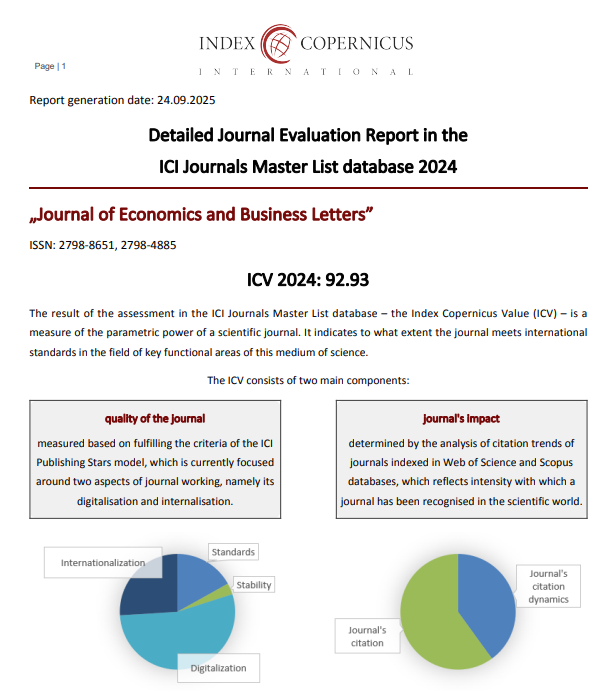Green accounting in Indonesia pathways to sustainable economic development
DOI:
https://doi.org/10.55942/jebl.v2i1.282Keywords:
Green Accounting, Sustainable Development, Environmental Sustainability, Economic Growth, IndonesiaAbstract
This study examines the implementation and impact of Green Accounting practices in Indonesia, a nation at the crossroads of rapid economic growth and environmental sustainability challenges. Utilizing a mixed-methods approach, the research combines qualitative insights from interviews with policymakers, corporate accountants, environmental NGOs, and academic experts, with quantitative analysis from company surveys and national environmental indicators. The findings reveal a growing awareness and gradual adoption of Green Accounting practices among Indonesian businesses, driven by regulatory pressures, international collaboration, and a burgeoning corporate social responsibility ethos. However, the study also identifies significant barriers to widespread implementation, including technical expertise gaps, regulatory shortcomings, and limited recognition of the long-term economic benefits of environmental sustainability. Despite these challenges, the research underscores the potential of Green Accounting to reconcile economic development with environmental preservation in Indonesia. The study contributes to the discourse on sustainable development by highlighting the importance of regulatory support, capacity building, and mindset shifts towards long-term sustainability. It calls for a concerted effort among stakeholders to overcome existing obstacles and fully realize the benefits of Green Accounting for Indonesia's future.
References
Bartelmus, P., & Seifert, E. K. (Eds.). (2018). Green accounting. Routledge.
Brooks, C., & Schopohl, L. (2020). Green accounting and finance: Advancing research on environmental disclosure, value impacts and management control systems. British Accounting Review, Forthcoming.
Chopparapu, S. S., & Lewis, M. B. (2017). What Is Green Accounting?
Deb, B. C., Saha, S., & Rahman, M. M. (2020). Does green accounting practice affect bank performance? A study on listed banks of Dhaka stock exchange in Bangladesh. PalArch's Journal of Archaeology of Egypt/Egyptology, 17(9), 7225-7247.
Egan, M., & Tweedie, D. (2018). A “green” accountant is difficult to find: Can accountants contribute to sustainability management initiatives?. Accounting, Auditing & Accountability Journal, 31(6), 1749-1773.
Fahlevi, M., Saparudin, M., Maemunah, S., Irma, D., & Ekhsan, M. (2019). Cybercrime business digital in Indonesia. In E3S Web of Conferences (Vol. 125, p. 21001). EDP Sciences.
Lee, H. Y., Liu, C. F., Yain, Y. S., & Lin, C. H. (2020). Intellectual capital for green accounting in agribusiness. International Food and Agribusiness Management Review, 23(5), 759-765.
Panigrahi, R. (2017). Incidence of Green Accounting on Competitiveness: Empirical Evidences from Mining and Quarrying Sector. In Business Analytics and Cyber Security Management in Organizations (pp. 270-278). IGI Global.
Saputra, K. A. K., Manurung, D. T., Rachmawati, L., Siskawati, E., & Genta, F. K. (2021). Combining the concept of green accounting with the regulation of prohibition of disposable plastic use. International Journal of Energy Economics and Policy, 11(4), 84-90.
Silva, Junger da R., Tommasetti, R., Zaidan Gomes, M., & da Silva Macedo, M. Á. (2020). How green is accounting? Brazilian students’ perception. International Journal of Sustainability in Higher Education, 21(2), 228-243.
Singh, S., Singh, A., Arora, S., & Mittal, S. (2019, October). Revolution of green accounting: A conceptual review. In 2019 2nd International Conference on Power Energy, Environment and Intelligent Control (PEEIC) (pp. 481-485). IEEE.
Yang, W., & Zhao, J. (2018). Sources of China's economic growth: A case for green accounting. Advances in Management and Applied Economics, 8(2), 33-59.
Downloads
Published
How to Cite
Issue
Section
License
Copyright (c) 2022 Journal of Economics and Business Letters

This work is licensed under a Creative Commons Attribution 4.0 International License.
















